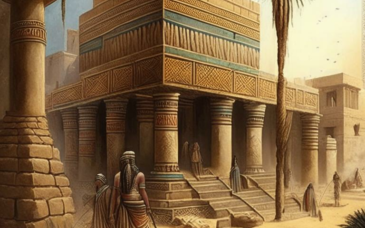Step back in time as we unravel the captivating stories of ancient nations, civilizations that once thrived, flourished, and left an indelible mark on the pages of history. From the banks of the Nile to the valleys of Mesopotamia, join us on a journey through the rise and fall of these venerable societies.
Mesopotamia: Cradle of Civilization
- Sumerians and the Birth of Writing: Venture into the fertile plains of Mesopotamia, where the Sumerians pioneered the art of writing with cuneiform script, laying the foundations for recorded history.
- Babylonians and the Code of Hammurabi: Explore the heights of Babylonian civilization, marked by the renowned Code of Hammurabi—a legal codex that provided a glimpse into the societal norms of the time.
- Assyrians and the Warrior Empire: Witness the military prowess of the Assyrians, whose formidable empire dominated the ancient Near East through military might and strategic conquests.
Ancient Egypt: Land of Pharaohs
- The Pyramids and Pharaohs: Marvel at the architectural marvels of the Egyptian pyramids and delve into the rule of pharaohs who wielded both political and religious authority.
- Hieroglyphs and Papyrus: Explore the intricate system of hieroglyphic writing and the use of papyrus, essential elements in preserving the wisdom and knowledge of ancient Egyptian civilization.
- The Nile as Lifeline: Understand the significance of the Nile River as the lifeblood of Egypt, enabling agricultural prosperity and sustaining a thriving civilization.
Indus Valley Civilization: Mysteries of the Subcontinent
- Harappa and Mohenjo-Daro: Uncover the mysteries of the Indus Valley Civilization, marked by sophisticated urban planning in cities like Harappa and Mohenjo-Daro.
- Trade and Maritime Connections: Explore the trade networks and maritime connections that linked the Indus Valley with other ancient cultures, showcasing a sophisticated understanding of commerce.
Ancient Greece: Birthplace of Democracy
- City-States and Philosophers: Enter the world of ancient Greece, where city-states like Athens and Sparta flourished, giving rise to philosophical giants like Socrates, Plato, and Aristotle.
- Olympic Games and Cultural Achievements: Witness the glory of the Olympic Games and the cultural achievements of ancient Greece, from epic poetry to groundbreaking advances in mathematics and astronomy.
The stories of ancient nations echo through time, offering profound insights into the human experience. Join us on this historical voyage as we uncover the marvels and achievements of civilizations that have long since faded, yet continue to inspire and influence the course of our shared history.


